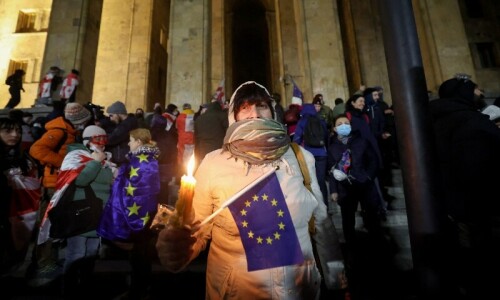MATHURA: Muslim teacher Tasleem Qureshi’s walk to the polls on Friday took her past the yellow barricades and police cordon guarding a mosque _ a looming flashpoint in India’s religious divide.
Her hometown Mathura is the site of the Shahi Idgah, which Hindus believe was built over the birthplace of the deity Krishna.
Hindu activists want to “reclaim” the site in a campaign endorsed by members of Prime Minister Narendra Modi’s ruling Bharatiya Janata Party (BJP).
“The BJP keeps saying that the Shahi Idgah will cease to exist after the elections,” Qureshi, 48, said.
“We will not let that happen and we will protect it with our lives,” she said.
Mathura is one of several locations across India’s northern heartlands where activists have sought to replace centuries-old Islamic monuments with Hindu temples.
In January, Modi presided over the inauguration of a grand temple to Ram in the northern city of Ayodhya on the grounds of the centuries-old Babri mosque, razed by Hindu zealots in 1992.
Modi told an audience of thousands at a glitzy ceremony attended by Bollywood celebrities and cricket stars that India was “creating the genesis of a new history”.
Construction of the temple fulfilled a long-standing demand of Hindu activists and was widely celebrated across India, with extensive television coverage and street parties. Jubilant Hindu activists had proclaimed when the mosque was destroyed that more would follow, identifying the Shahi Idgah in Mathura as one of their future targets.
Modi’s opponents accuse his Hindu-nationalist government of marginalising India’s 220-million-plus Muslims.
He was accused last weekend of “blatantly targeting” the coomunity in a campaign speech in which he claimed his opponents had once pledged that Muslims had “first right over the nation’s wealth”.
‘Most important issue’
Temples small and large line Mathura’s narrow, pot-holed streets, teeming with young men offering guided tours for pilgrims.
The street leading to the mosque has for decades been guarded by a stern, round-the-clock police detachment to prevent vandalism.
A polling station nearby is testament to the close quarters in which the city’s two main communities live, with women in Muslim dress voting alongside saffron-clad Hindu priests.
Microcosm of religious divide
But with Hindus accounting for more than 80 per cent of Mathura’s population, its religious divide is a microcosm of the one across India at large.
Its parliamentary seat has been held by the BJP since Modi was first elected in 2014, represented by movie star Hema Malini, and the Ayodhya temple’s inauguration has galvanised Hindu voters in the city who support the mosque’s removal.
Gokul Prasad, an electrician, said Modi’s inauguration of the Ayodhya temple was the “single most important issue” of the election campaign.
“Since we live in Mathura so close to the Shahi Idgah, we will obviously vote for Modi,” the 50-year-old said.
The fate of the Shahi Idgah has also mobilised the city’s Muslims. But several said they had lined up to vote on Friday only to find their names were missing on the electoral rolls. “They told me neither I nor my husband can vote as our names are not there,” said 55-year-old Rehana Qureshi, no relation to Tasleem, outside a polling booth.
Published in Dawn, April 27th, 2024















































Dear visitor, the comments section is undergoing an overhaul and will return soon.